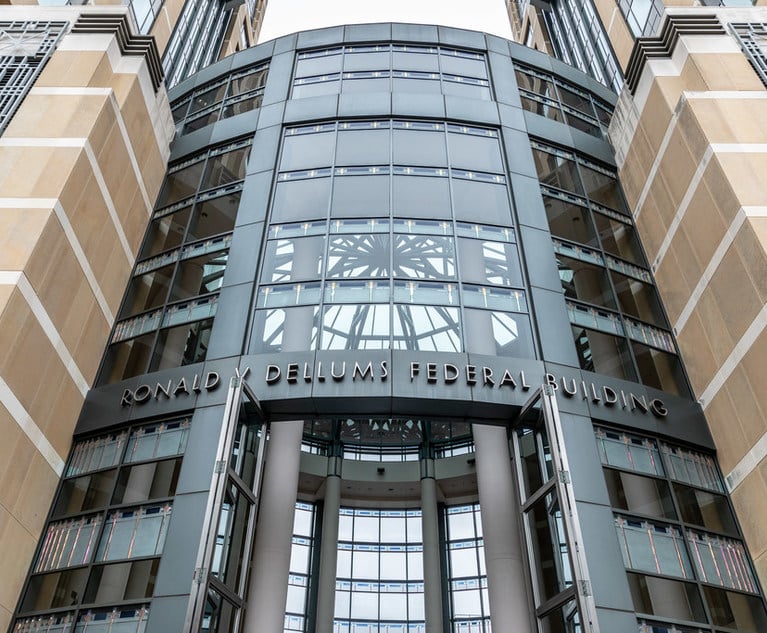Apple Almost Back on Hook for $440 Million Patent Judgment
The Federal Circuit ordered the USPTO to reconsider an attack on the validity of two patents held by VirnetX, which holds two judgments worth almost $1 billion against the iPhone maker.
July 08, 2019 at 07:50 PM
4 minute read
 Screenshot of VirnetX's website.
Screenshot of VirnetX's website.The Federal Circuit continued Monday to resuscitate a $440 million patent infringement judgment against Apple Inc.
For the second time in the last two weeks, the D.C.-based appellate court ordered the Patent Trial and Appeal Board to reconsider parts of decisions invalidating patent claims that VirnetX Inc. successfully asserted against Apple Inc. in a 2016 Eastern District of Texas trial.
Monday's decision gave VirnetX's stock a 4% jolt. Its market cap has more than doubled since the Federal Circuit first began surfacing its concerns about the PTAB decisions at January oral arguments. The cases involve four VirnetX patents on secure online communications.
The Federal Circuit summarily affirmed the trial court judgment in January. But Cisco Systems Inc. and other entities have for years been blanketing the Patent Trial and Appeal Board with challenges to the patents' validity. Apple has been pleading with the Federal Circuit not to declare the trial court appeal final until the validity challenges are resolved.
Monday's decision in VirnetX v. The Mangrove Partners means one of those validity challenges will at the very least have many more months to run. It's a win for a Paul Hastings team led by partner Naveen Modi. Also contributing were partners Stephen Kinnaird, Joseph Palys and Igor Timofeyev and associates Michael Wolfe and Daniel Zeilberger.
Wilmer Cutler Pickering Hale and Dorr represented Apple, while James Bailey of the Law Office of James T. Bailey represented The Mangrove Partners Master Fund Ltd.
The litigation dates to 2010, when VirnetX won a $368 million jury verdict. The Federal Circuit affirmed the validity of VirnetX's patents in a 2014 opinion but sent the case back due to claim construction issues and VirnetX's failure to apportion the damages for the value of the patents.
A retrial resulted in the $440 million judgment. (Another jury has since awarded an additional $503 million based on newer Apple products, though that award remains pending appeal.)
In the meantime, Apple tried to challenge the validity of the patents under the inter partes review procedures established in 2012 by the America Invents Act. But the PTAB ruled Apple's petitions untimely, because the AIA requires parties who've been sued to petition within one year of the lawsuit.
Other entities then began filing petitions, with VirnetX complaining that they are front groups doing Apple's bidding. The PTAB rejected RPX Corp. petitions when discovery showed that Apple had paid it $500,000 just before they were filed. But the Mangrove Partners' petitions, which challenge U.S. Patents 6,502,135 and the 7,490,151, got the green light. Apple was then allowed to join the proceedings, but not introduce new art or arguments.
On Monday, the court found the PTAB committed a series of errors. While not taking a position on RPX's relationship with Mangrove, the court ruled that VirnetX was at least entitled to more discovery into the relationship.
“The Board abused its discretion in denying VirnetX the ability to even file a motion,” Judge Kimberly Moore wrote for the court.
Moore found no prejudice in Apple's joinder, but “we leave open the question of whether prejudice could arise later.”
The court also found that the PTAB erred in construing claims of prior art used to invalidate VirnetX's claims and improperly discounted a disclaimer made by VirnetX during a previous inter partes reexamination. “Never have we authorized the Board to disregard clear and unmistakable statements of disclaimer from the prosecution history of a patent simply because it is the patent owner arguing for disclaimer,” Moore wrote.
Chief Justice Sharon Prost and Judge Jimmie Reyna concurred.
Last month the Federal Circuit partially reversed another PTAB judgment, ordering it to reconsider the validity of three claims of U.S. Patent 7,418,504, including one that underpins the $440 million judgment. The court also affirmed the invalidity of 33 other claims.
Several additional PTAB proceedings against VirnetX remain pending, presenting additional opportunities to invalidate patent claims, though maybe not in time to unwind VirnetX's first trial judgment.
This content has been archived. It is available through our partners, LexisNexis® and Bloomberg Law.
To view this content, please continue to their sites.
Not a Lexis Subscriber?
Subscribe Now
Not a Bloomberg Law Subscriber?
Subscribe Now
NOT FOR REPRINT
© 2025 ALM Global, LLC, All Rights Reserved. Request academic re-use from www.copyright.com. All other uses, submit a request to [email protected]. For more information visit Asset & Logo Licensing.
You Might Like
View All

Crypto Entrepreneur Claims Justice Department’s Software Crackdown Violates US Constitution
4 minute read
Kraken’s Chief Legal Officer Exits, Eyes Role in Trump Administration
3 minute read
Crypto Exchange’s ‘Meteoric Rise’ Leads to Nationwide Class Action Trend
4 minute readTrending Stories
- 1Lawyers: Meet Your New Partner
- 2What Will It Mean in California if New Federal Anti-SLAPP Legislation Passes?
- 3Longtime AOC Director Glenn Grant to Step Down, Assignment Judge to Take Over
- 4Elon Musk’s Tesla Pay Case Stokes Chatter Between Lawyers and Clients
- 5Courts Demonstrate Growing Willingness to Sanction Courtroom Misuse of AI
Who Got The Work
J. Brugh Lower of Gibbons has entered an appearance for industrial equipment supplier Devco Corporation in a pending trademark infringement lawsuit. The suit, accusing the defendant of selling knock-off Graco products, was filed Dec. 18 in New Jersey District Court by Rivkin Radler on behalf of Graco Inc. and Graco Minnesota. The case, assigned to U.S. District Judge Zahid N. Quraishi, is 3:24-cv-11294, Graco Inc. et al v. Devco Corporation.
Who Got The Work
Rebecca Maller-Stein and Kent A. Yalowitz of Arnold & Porter Kaye Scholer have entered their appearances for Hanaco Venture Capital and its executives, Lior Prosor and David Frankel, in a pending securities lawsuit. The action, filed on Dec. 24 in New York Southern District Court by Zell, Aron & Co. on behalf of Goldeneye Advisors, accuses the defendants of negligently and fraudulently managing the plaintiff's $1 million investment. The case, assigned to U.S. District Judge Vernon S. Broderick, is 1:24-cv-09918, Goldeneye Advisors, LLC v. Hanaco Venture Capital, Ltd. et al.
Who Got The Work
Attorneys from A&O Shearman has stepped in as defense counsel for Toronto-Dominion Bank and other defendants in a pending securities class action. The suit, filed Dec. 11 in New York Southern District Court by Bleichmar Fonti & Auld, accuses the defendants of concealing the bank's 'pervasive' deficiencies in regards to its compliance with the Bank Secrecy Act and the quality of its anti-money laundering controls. The case, assigned to U.S. District Judge Arun Subramanian, is 1:24-cv-09445, Gonzalez v. The Toronto-Dominion Bank et al.
Who Got The Work
Crown Castle International, a Pennsylvania company providing shared communications infrastructure, has turned to Luke D. Wolf of Gordon Rees Scully Mansukhani to fend off a pending breach-of-contract lawsuit. The court action, filed Nov. 25 in Michigan Eastern District Court by Hooper Hathaway PC on behalf of The Town Residences LLC, accuses Crown Castle of failing to transfer approximately $30,000 in utility payments from T-Mobile in breach of a roof-top lease and assignment agreement. The case, assigned to U.S. District Judge Susan K. Declercq, is 2:24-cv-13131, The Town Residences LLC v. T-Mobile US, Inc. et al.
Who Got The Work
Wilfred P. Coronato and Daniel M. Schwartz of McCarter & English have stepped in as defense counsel to Electrolux Home Products Inc. in a pending product liability lawsuit. The court action, filed Nov. 26 in New York Eastern District Court by Poulos Lopiccolo PC and Nagel Rice LLP on behalf of David Stern, alleges that the defendant's refrigerators’ drawers and shelving repeatedly break and fall apart within months after purchase. The case, assigned to U.S. District Judge Joan M. Azrack, is 2:24-cv-08204, Stern v. Electrolux Home Products, Inc.
Featured Firms
Law Offices of Gary Martin Hays & Associates, P.C.
(470) 294-1674
Law Offices of Mark E. Salomone
(857) 444-6468
Smith & Hassler
(713) 739-1250










